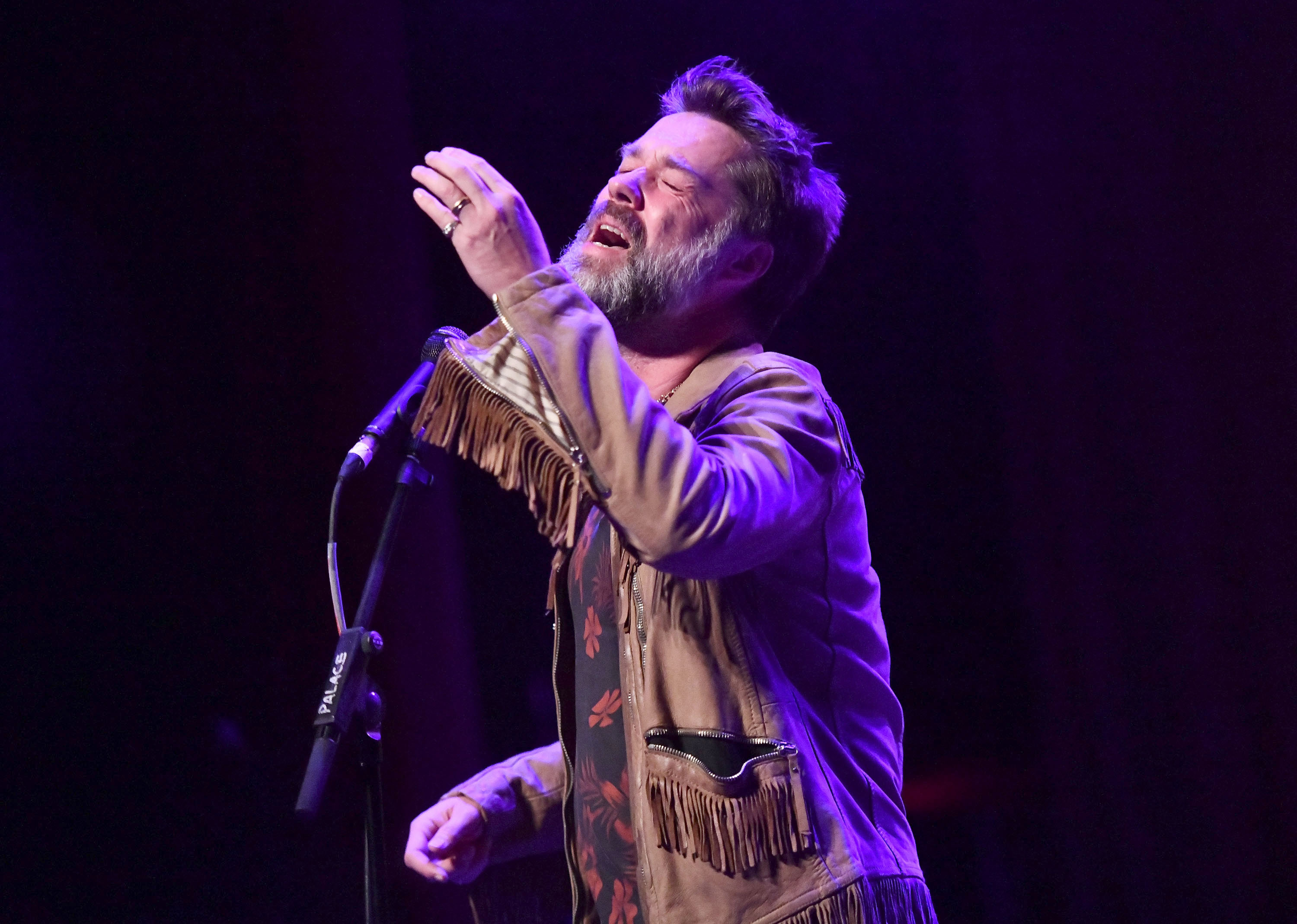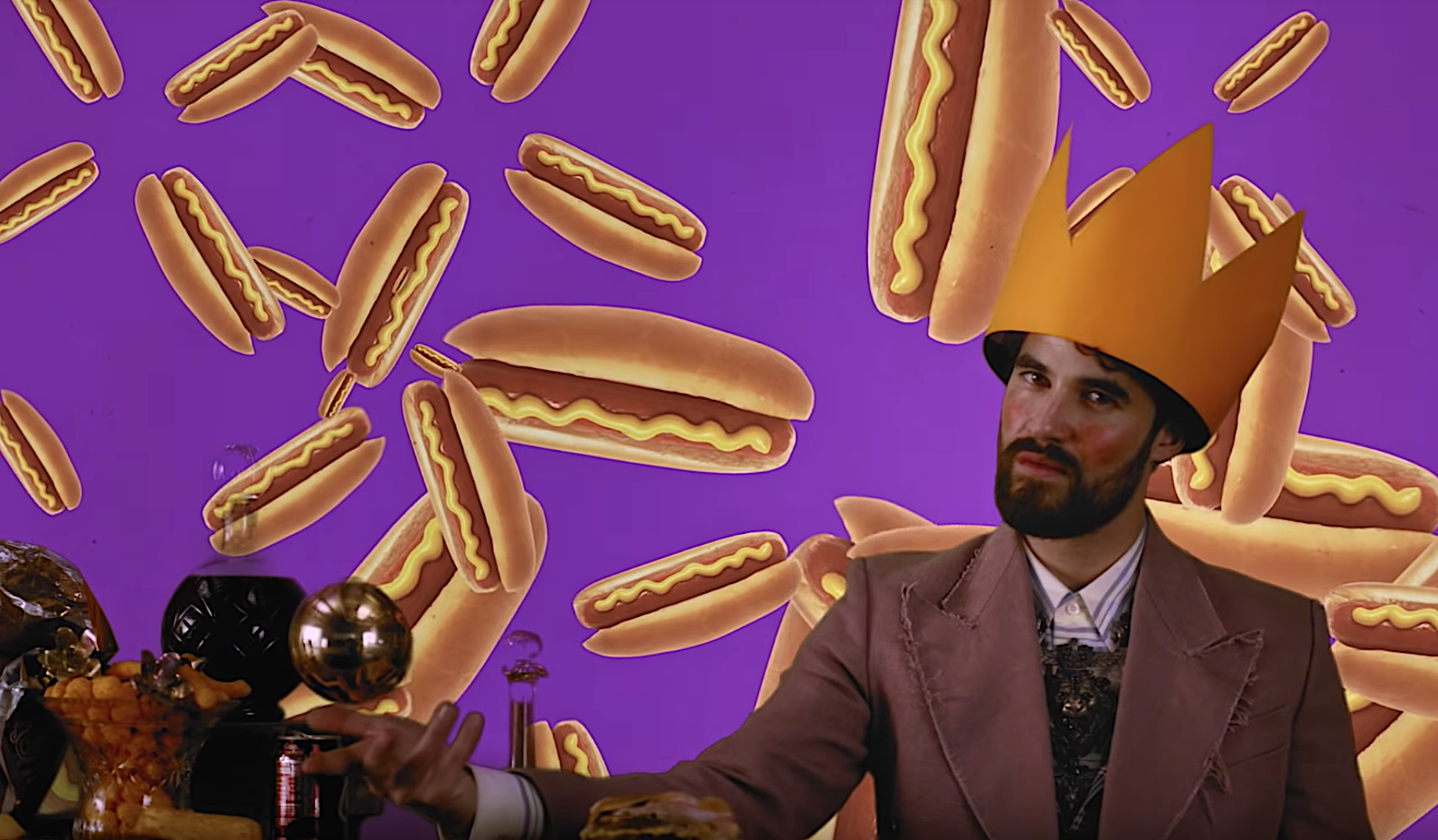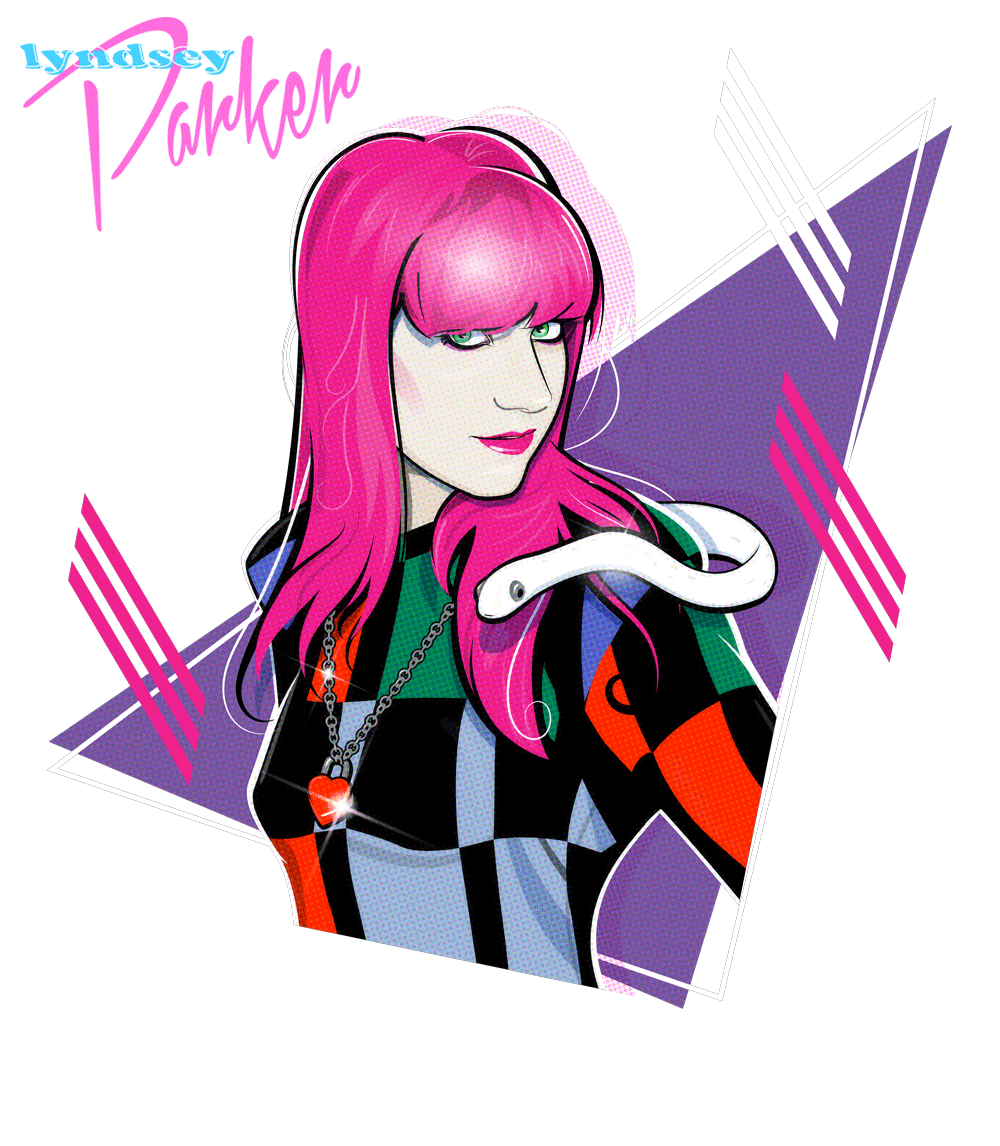
Rufus Wainwright performs at the Last Weekend Kickoff L.A., presented by Swing Left at the Palace Theatre on Nov. 1 in Los Angeles. (Photo: Scott Dudelson/Getty Images)
“Dear Mr. President: This ancient story from the 4th century reminds me of you. Love, Rufus.” So reads the cold open of “Sword of Damocles,” the new political music video by venerable American-Canadian singer-songwriter Rufus Wainwright.
The colorful, conceptual clip — starring Emmy-winner Darren Criss as a buffoonish pretender to the throne who usurps power from a more competent leader played by Wainwright — is based on an old folktale in which Damocles, a sycophantic courtier in the court of Dionysius II of Syracuse, is granted the opportunity to switch places with Dionysius and be king for a day. But then, during a royal banquet, Damocles notices a sword suspended above him by a single horse hair. He realizes that the life of a ruler “isn’t all crowns and cheeseburgers,” as he had assumed — and he begs to leave and return to his life as a commoner.

Darren Criss in Rufus Wainwright’s “Sword of Damocles” video. (Photo: Aserkh Music)
In the song “Sword of Damocles,” inspired by the current tumultuous political climate, Wainwright claims history is repeating itself, with Donald Trump in the Damocles role.
“This is my artistic response to what I see currently transpiring within the American government and how its collapse is affecting every aspect of existence for us all. … The famed, ancient expression ‘Sword of Damocles’ is a parable of impending doom of and to those in positions of power,” Wainwright explains in a statement. “This timeless tale points out the hard fact that with great power, comes great responsibility, and for all concerned, great danger.”
“Sword of Damocles” is the latest bold statement in the two-decade career of 45-year-old Wainwright (son of legendary folk singers Kate McGarrigle and Loudon Wainwright III), which has included nine studio albums, two original operas, various theatrical and dance productions, and his current “All These Poses” 20th anniversary concert tour. Yahoo Entertainment caught up with him about the message of “Sword of Damocles,” his hopes and fears for the future, his own #MeToo story and whether musicians (or the “Hollywood elite”) have a duty to be politically outspoken.
Yahoo Entertainment: Can you explain a bit about why the tale of Damocles reminds you of Trump?
Rufus Wainwright: Well, I wanted to be pretty open-ended about that. It’s not so much that I think Trump is Damocles, or is a king, or anything like that. It’s more the situation that the myth engenders. I feel that we are all living in this moment. Basically, the fox is in the henhouse, and there’s going be hell to pay, I think, for everyone. The sword is hanging over all of our heads, and we are all both the king and Damocles. It’s more this impending doom that Damocles discovers in the myth that we are now discovering on so many levels. I think of Trump more now as an illustration or incarnation of that pending chaos. It’s not the most positive outlook, but I think nonetheless it’s good to face the facts and be a warrior for good.
I know you wrote this song leading up to the midterms. With some of the results that came from the midterms, is your outlook a little more positive now?
Yes, I will say that one of the few shreds of hope that I’ve held onto is actually the old-fashioned attitude that the Founding Fathers were brilliant and created a really unique document with the Constitution. I think that when you look at the midterms, when you look at the American system compared to others, it’s hopeful. It does give a certain amount of hope. I’m satisfied with the midterm results… It’s nice to see that the pendulum is starting to at least, you know, stop. It hasn’t swung all the other way but maybe it’s stopped. That’s a good way of putting it.
Do you feel that musical artists or celebrities, particularly in the current climate we’re in, have a duty or an obligation to speak out? Because some people are of the mindset of “We don’t care what musicians think. Stay out of politics!”
That whole attitude of artists shouldn’t say anything political, I don’t know where the hell that comes from. The only person who I can think about who expressed that and kind of stood by that was Pat Boone or something. He’s really up there in terms of excellence! [laughs] I think all great artists have had a political gene, whether it’s for good or for bad. Whenever someone makes that argument, it’s just nonsensical, because there’s just no way to be an artist and not be affected by what’s going on in the world around you. It’s not like we live in a bell jar or something. I just don’t comprehend that argument.
But sometimes I do wonder if artists or celebrities can make a difference when they speak out — or if it has a backlash effect. I look to the 2016 election, when there were a lot of huge artists, like Katy Perry and Beyoncé, stumping for Hillary Clinton, but we all saw how things turned out.
I guess there is a certain amount of backlash, but I think that’s too easy of an equation. It’s not the celebrities that drove people away. It’s because certain people are racist and sexist, and were acting on that impulse. America is a really f***ed-up country. I think it’s a bit of a scapegoat when celebrities are blamed. I did a lot of those rallies and I was up onstage with Barbra Streisand and Jane Fonda and stuff, and I can see how people might get jealous of the fabulous lives that we get to lead in show business, because it is a great existence. But they’re going hate us anyway, no matter what we do. So you might as well be yourself.
So how did you get Darren Criss involved in the “Sword of Damocles” video? He’s having a real moment right now, having just won the Emmy for The Assassination of Gianni Versace.
I met him through Alan Cumming. And, OK, here is another reason why Middle America will hate me [laughs]: Alan Cumming rented out a section of Disney World, the water park, for his 50th birthday, and that’s where I got to meet Darren. Both of us met in very skimpy bathing suits, on a waterslide. He professed his great love for my work, and every time I run into him subsequently, he’s always so enthusiastic about music and stuff. So I contacted him and he didn’t hesitate. He wanted to do it right away, so. Now, it so happens to be coinciding with his meteoric rise to fame, so some god is smiling upon us.
Since we’re sort of talking about Hollywood, when I saw you kick off your “All These Poses” tour at L.A.’s Orpheum Theater to celebrate the 20th anniversary of your debut album, you talked onstage about how when you were first making your way, you had difficulty finding acceptance in the business. But L.A., with all of its weirdness, was the city that welcomed you. Tell me about that.
I was born in upstate New York, then I grew up in Canada and my father lived in Manhattan. I had a good three or four college tries in New York City with my music where I would try to play all the clubs and stuff, and it really didn’t work. I was too exotic a flower for that rough ‘n’ tumble downtown world! It was really when I went to Los Angeles [that my career took off]. Being signed by DreamWorks Records certainly helped! But I kind of fell right into this psychedelic, orchestral, dandy-ish sort of tradition that California has always been more comfortable with — people like Van Dyke Parks, Randy Newman, Harry Nilsson and, of my era, Jon Brion, Elliott Smith and so forth.
DreamWorks no longer exists as a label, and it seems like the ’90s was a much more fertile time for artist development. You had the luxury to work on your debut album for a very long time, almost two years. A new artist would never get that chance now.
Well, I think even at the time I was aware, and everybody was aware, that that was the end of the ride for that approach. Whether I was working with Lenny Waronker or Mo Ostin and being able to demo at Ocean Way Studios for a year, we all knew that I was the end of an era [of extravagant record label spending]. … A lot of people felt like I was too privileged, so it became a little bit of a blemish that I had to contend with, especially when I went to Europe. Which I later conquered! Europe finally came to its senses. [laughs] I remember being keenly being aware of this, that I was in the last train of this express.
In the 20 years since your first album — between downloads, both illegal and legal, and of course, streaming — it’s hard for any new artist, even if they are connected or from a background of privilege, to get those chances.
I was very fortunate to have this opportunity, but I never, ever relied on it. This comes from living with my mother and my father and seeing my father’s career. They really had to struggle [as musicians] for many, many years. They weren’t successful by many accounts in the industry. I just thought that it all boiled down to what you can do as a singer-songwriter in a room with 50 people and milk money. I always maintained this deep sense of brute survival. I was never seduced by the luxuries surrounding me. And I owe it to that kind of plain view that I’m still around today. In terms of today, I still think that’s the best attitude to take. You are only as good as your last show, and it’s really about entertaining a crowd of people, in that moment, in that one place, that will determine your fate.
Obviously, you come from a musical family, and I know your 7-year-old daughter Viva’s mother [Lorca Cohen, daughter of Leonard Cohen] descends from that as well. Has your daughter shown any signs of being musically inclined? Would you encourage her to go into music?
I don’t press it. She does have a very beautiful voice. On one hand, I want to be encouraging, but I also have to be mindful that it’s a treacherous path and that it should be something that she really wants to do, fundamentally, and we’ll see if she does or not.
But if she does want to pursue music professionally someday, you won’t say, “No! Go to med school instead!”
No, but I’ll be very honest about how hard it is and so forth. But look, it’s not as hard as med school.
Back on the subject of the political climate, I know it’s a cliché, but a lot of people do think that in dark times the best art and music emerges. I wonder if you agree with that, or if you’re seeing a renaissance currently.
Well, I want to believe that. The darkest times are yet to come, so there’s still hope! [laughs]
That’s one way of looking at it!
I will say that what’s being downloaded, what’s being streamed, what you see on Saturday Night Live, what you hear on the radio, it’s not particularly challenging. But I do think that it does go dark before sunrise.
I know you’ve gone through your own personal struggles. Do you find that your best music comes from your darkest personal periods?
Well, yes. But life is full of such darkness. I was listening to some other albums of mine the other day because I was in this retrospective mode, and certainly Songs for Lulu, which was around my mother’s death, was a very dark period. And then the trials and tribulations of bringing up a teenager [in the coming years], I’m sure that’ll be fun. And then, your body falls apart. So there’s gonna be lots of great songs! [laughs]
Referring to your other personal struggles, I know that you were sexually assaulted when you were 14. In the #MeToo era, some men have come forward about their experiences being assaulted, although it’s mostly women. You were open about it in interviews long ago. Were any of the recent #MeToo stories triggering for you? What are your general thoughts?
I did “Me Too” at one point, early on in the discussion, when it first started, and I felt good about having put that forth. But I had talked about it earlier on in my career. I will say that at this juncture of the whole discussion, I am more concerned about women’s rights in general. I think, for instance, that passage of that law in Ohio that makes it illegal to have an abortion if the fetus has a heartbeat, all that kind of stuff, is so frightening to me. And certainly after the elections with how people really turned on Hillary — in a very disgusting way, in many cases — was very discouraging. So I’d say before anything, I’m a feminist. Of course, the #MeToo movement is involved in that, but I think that concern for women’s rights is more where I put the pressure right now.
What is your No. 1 concern about the world right now?
Right now, above even the women’s issues, I would say it’s the environment, hands down. … The environmental situation affects everybody. Rich. Poor. Gay. Straight. Man. Woman. Child. And I think if it’s framed properly and everybody is emboldened, it could be the great equalizer of our era — to fight for the survival of the planet.
I know “Sword of Damocles” won’t be on your next full-length album, but will that album be affected by what’s going on in the world politically?
I don’t know how political my next album is, really. I’m working with the amazing producer Mitchell Froom in Santa Monica, and we’re having a ball. I do feel that, at least, musically and career-wise, I would like to start focusing on my craft as a “survivor” — I’m not going to say “elder statesman” just yet.
This article originally ran on Yahoo Music.







